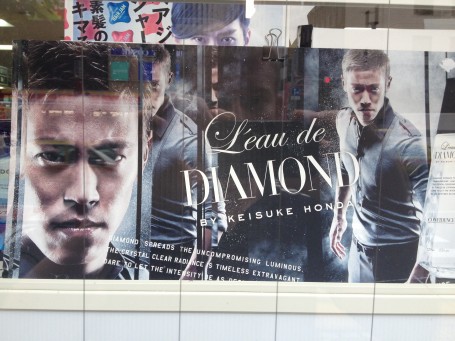by Andy Gause
Sports and the way a country reacts to them, particularly in defeat, speaks volumes about a culture. We had the marvelous fortune to travel in Japan while the country was in the grips of World Cup fever. The dark “Blue Samurai” World Cup uniforms were ubiquitous in Tokyo, and pictures of the photogenic football superstar Keisuke Honda plastered everything from sodas to shampoo and baby food. As part of a limited time deal, McDonald’s formed their buns in the shape of a soccer ball. I have not yet ordered a McDonald’s burger to discover if the poster’s promise matches the final product, as I’ve been too busy eating more uniquely Japanese cuisine. Despite the general excitement surrounding the games, the Japanese team failed to live up to expectations, losing two games and tying the other. In total, the team only scored two goals in their three matches. However, there was no resentment among the fans. Following their first loss, the television was flooded with footage of young fans swarming the Tokyo streets. I asked Chad, our teaching assistant, if they were rioting, but he told me that, in fact, the youth were showing their support for the team. Even after losing 2-1 to the Ivory Coast, a team they were projected to beat, the country was immensely proud of its team. I can’t imagine young people in America or Europe running into the streets to demonstrate their support following a disappointing loss. Unfortunately, I wasn’t able to view any of the games with the Japanese. The tremendous time difference between Brazil and Tokyo resulted in 4am, 7am, and 8am start times, which were either too early or conflicted with bus travel. I was able to watch the USA games, but was not joined by any fellow countrymen or students from the trip.
None of the Meiji students I spoke with are die-hard football fans (they also couldn’t justify waking up at 4am to watch a football game), but in general they seem to care more than the USC students. In Japan, baseball is king, even more so than football. Every Japanese student I’ve spoken with knows the stats of Masahiro Tanaka and Yu Darvish, former Japanese players now pitching in the MLB. It’s not uncommon to see a young man in a New York Yankees or Detroit Tigers uniform. I’ve even seen a jersey for my team, the Oakland Athletics, which is surprising considering Oakland is such a small city. I’m shocked at the lack of Japanese baseball merchandise. Maybe it’s because I don’t recognize their team logos, but it seems that American teams are more popular, at least in terms of merchandising. I’ve also found out that badminton and rugby are much more popular here in Japan than in the US. This makes sense considering Japan’s proximity to Australia and China. During our weekend trip to Yamanaka Lake, we played tennis, basketball, and ping pong with the Meiji students. As Nixon proved in the 70’s, there’s nothing quite like ping pong to melt cultural differences and bring people together. The Meiji students were great sports and never show-boated or talked trash. Their politeness in defeat and victory is quite endearing when compared to America’s macho, braggart sports culture.

